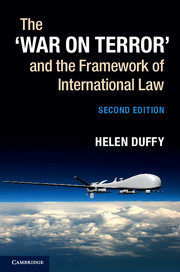Book contents
- Frontmatter
- Dedication
- Contents
- Preface to the second edition
- Preface to first edition
- Select table of cases
- Select table of treaties
- Select Table of resolutions, reports and other sources
- Select list of abbreviations and acronyms
- 1 Introduction
- Part I Terrorism and responsibility
- 2 ‘Terrorism’ in international law
- 3 International responsibility, terrorism and counter-terrorism
- Part II Responding to terrorism: legal framework and practice
- Part III Case Studies
- Select bibliography
- Index
- References
3 - International responsibility, terrorism and counter-terrorism
Published online by Cambridge University Press: 05 April 2015
- Frontmatter
- Dedication
- Contents
- Preface to the second edition
- Preface to first edition
- Select table of cases
- Select table of treaties
- Select Table of resolutions, reports and other sources
- Select list of abbreviations and acronyms
- 1 Introduction
- Part I Terrorism and responsibility
- 2 ‘Terrorism’ in international law
- 3 International responsibility, terrorism and counter-terrorism
- Part II Responding to terrorism: legal framework and practice
- Part III Case Studies
- Select bibliography
- Index
- References
Summary
The question of responsibility for acts of international terrorism, or responses to international terrorism, has permeated discussion since 9/11. Was a state responsible for the 9/11 attacks, or for acts of international terrorism since then, and according to what legal standard? To what extent do the permissible responses, including the resort to armed force, depend on responsibility? Questions regarding state responsibility for terrorism have arisen to similar effect in many other contexts, before and after 9/11, such as in relation to the killing of former Lebanese Prime Minister Harari, the Lockerbie bombing or, more recently, in the context of allegations of Iranian involvement in attempts on US territory and beyond.
In addition to questions of state responsibility for terrorism itself are others concerning counter-terrorism: in the context of multi-faceted inter-state cooperation post-9/11, in what circumstances are states responsible in connection with wrongs by other states, or by private security companies carrying out security or counter-terrorism measures at the behest of the state? While the focus of this chapter is on state responsibility, fundamental questions also arise regarding those individuals and entities accused of being engaged in terrorism: to what extent can al Qaeda, or associated entities or individuals, be considered responsible under international law?
- Type
- Chapter
- Information
- The ‘War on Terror' and the Framework of International Law , pp. 75 - 116Publisher: Cambridge University PressPrint publication year: 2015



